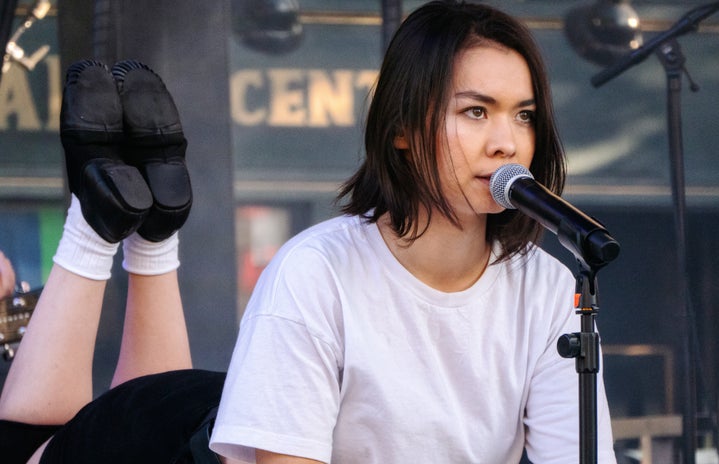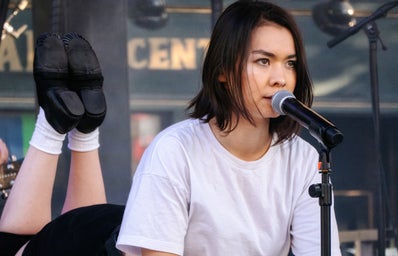The indie-alt icon sweeps, presumably one last time.
Recently crowned as the highest selling album the week of Feb. 7, with a whopping 17,000 vinyl sales, Mitski returns where she is needed most in her 6th studio album Laurel Hell. The 31-year-old Japanese-American artist has said in the past that the sad girl narrative that has followed her relentlessly since the start of her career is tired and overwrought, and Laurel Hell proves this point to a tee.
Proving that a cornered “sad-girl” malaise gets fatigued quickly, Mitski Miyawaki comes bashing in with tracks like “Stay Soft” and “The Only Heartbreaker.” Laurel Hell is dialed lyrically, but amped up instrumentally compared to spots on her other works Be The Cowboy and Puberty 2, while also providing more to Mitski’s lesser known public image. With constant reflection of aging and what it means to turn 30 today, Mitski provides little solution aside from the mere act of surrendering.
There’s a finality in her lyrics, “There’s not much I can do, not much I can change,” as she bellows on the 3rd single in the album roll out “Heat Lightning.” Similarly, on the next track “The Only Heartbreaker,” Mitksi laments that she “will be the loser in this game,” proclaiming a newly found security. This assurance comes in response to the process of the artist’s desire to quit music entirely in 2019 when she announced an indefinite hiatus due to the hardship that writing causes her. She has recently responded that although the cycle of hurt and numbness that comes with writing music seemed “to be shaving away at [her] soul little by little,” the songwriter has explained that feelings of pain are worth the struggle due to her devotion to the craft.
At barely over half-an-hour in time, the record seems to have created a more approachable jumping off point in Mitski’s work. With relatively short lyrical sequences that contain less detail than found on albums like Bury Me at Makeout Creek, this album creates an easier entrance point and place of introduction than previously had. Although the lyrical density is less than previously seen, the punch of heartbreak and realization that Mitski has portrayed is still very much present, especially in tracks like “I Guess” where she sings: “It’s been you and me since before I was me.”
Mitski always seems to know how to perfectly verbalize the feeling of wanting to know who you are so badly, but not being able to. She tells of the story of reluctance in a relationship. This being an affirmation of the unknown and the acceptance of reality as time passes and we grow older. Once deemed “The 21st Century’s Poet Laureate of Young Adulthood” by NPR, a title I’m sure she would despise, the stripped lyrical composition of Laurel Hell doesn’t give way to simplicity of meaning. Though not long and winding like Retired from Sad, New Career in Business, there is still vast substance to the tracklist. Perhaps it is the context of the album. Through listening to Mitski’s previous albums, you get a crisp image of what she is experiencing, and with the quitting music of it all, Laurel Hell combines her past heartbreak and tragedy with her newly fraught career path.
All in all, Mitski delivers where she needs to most in 2022. Laurel Hell doesn’t give too much, but doesn’t leave a lot to be desired. It wavers on a plane of knowing yourself and knowing yourself as an artist, debating when to give up and how, and most importantly when to “keep the machine running.”


